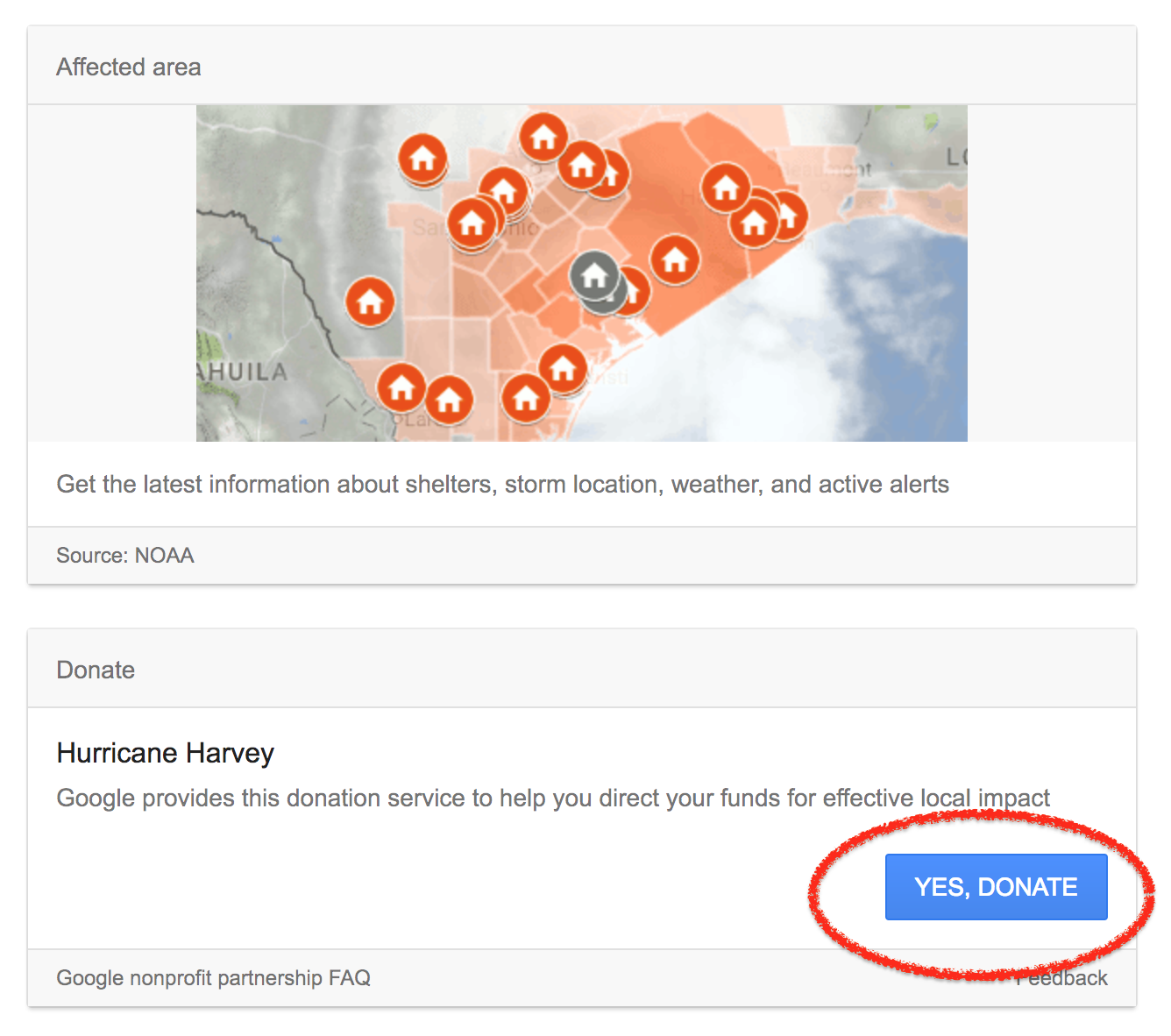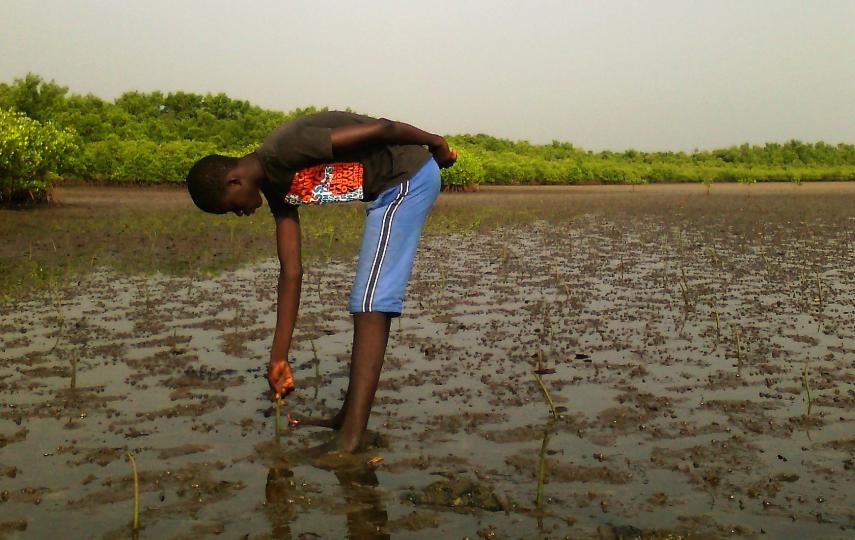In the wake of Hurricane Harvey, Google has chosen a little-known Washington DC advisory group as its public donation partner. Professional aid workers and fundraisers fear it lacks the proven capacity to manage and distribute the funds and so the strategy could backfire. In an inauspicious start, the charity’s website crashed today.
In times of crisis, US internet and media sites often suggest donating to well-known non-profits like the American Red Cross or Save the Children.
But the beneficiary of the “donate” button that appears on Google pages about Hurricane Harvey is the Center for Disaster Philanthropy – far from a household name, even in the aid world. It will distribute the funds to organisations it deems best placed to help.
A senior aid worker contacted by IRIN, who requested anonymity, said CDP “has never handled anywhere near the money that could possibly come in”. Facebook today also pledged to match donations to CDP made through its network up to a maximum of $1 million. A flurry of activity appears to have caused the organisation’s WordPress-based website to reject visitors due to too many connections.
CDP has a staff of seven, and its income in 2016 was around $4.4 million – up from three million the year before. It doesn’t claim to be an operational agency. As Bob Ottenhoff, its president and CEO, told IRIN: “We don’t provide the direct services… [we] provide information to donors, to foundations and corporations, to help them to think more strategically about their disaster philanthropy.”
CDP also acts as a fund manager, steering others’ donations, the model it will use for Google. The charity would not discuss details of the arrangement, but listed a “Google Disaster Consulting Grant” of $50,000 as income last year.
Depending on public sentiment and how the Google button performs, CDP could end up handling millions of dollars of relief funds for Hurricane Harvey, fundraisers estimate. On Tuesday it unveiled its “Harvey Recovery Fund”, emphasising medium- and long-term approaches. Another Harvey fundraising pool, set up by GlobalGiving, stands at about $700,000 at the time of writing. In 2005, 13 million Americans donated online for relief of hurricanes Katrina and Rita, according to the Pew Research Center. Public donations for Katrina topped $4 billion, according to Charity Navigator. Individual donors can have high expectations.
Ottenhoff told IRIN that CDP was ready to handle any spike in funding.
“We already have handled millions through other kinds of funds,” he said. “In the United States we’re the only organisation I know that is focused on disasters full-time.” CDP argues that one of its strengths is taking the longer view of disasters, including needs in the recovery period.
According to one experienced humanitarian manager, Google is choosing a go-between because it doesn’t want to vet charities, and then share responsibility for any failures.
The recommendation of charities by companies has become more sensitive due in part to extensive allegations of waste and inefficiency about the American Red Cross – published by writer Jonathan Katz and investigative outlet ProPublica, among others.
“People want their money used in real time,” said the senior aid worker. “That’s what killed the Red Cross in Haiti. They were sitting on tens of millions of dollars years later.”
A disaster fundraising expert gave a mixed reaction. He said that Google was showing a “welcome sign of belated humility”, by not attempting to pick how to spend the money itself. Familiar with the work of CDP, the expert said they were “sensible folk”, and the use of an intermediary made sense. However, he also questioned the charity’s capacity and its experience to handle the expenditure and monitoring of “quite significant” sums of money. The expert noted that many disaster relief groups had tried and failed to form fundraising relationships with Google and there may be some “sour grapes” among them.
The senior aid worker agreed, adding that other NGOs will be wondering: “Are you serious? Center for Disaster Philanthropy got the button on Google?!”
Observers also welcomed the possibility that CDP could take a longer view and resist pressure to spend money too quickly. Another funding analyst said: “CDP doesn't push funds out quickly as a rule, so they will tend to focus on medium- to long-term, which might also eliminate the dangers inherent in the need to act quickly and making decisions with imperfect information.” However, donors expect speed: “when people give in disasters they want it to start helping asap… so that's a complicated equation to balance.”
In an email to IRIN, CDP stressed the capacities of its broad network, saying: “we rely on advisory committees of subject matter experts, our own board and staff experience, our team research with other donors and non-profits active in the field.”
“I’m not saying they don’t know what they are doing,” the aid worker said. CDP is “careful” but has been slow in previous emergencies, he added. Senior staff at CDP have highly-regarded track records including with GuideStar and the Gates Foundation. CDP’s advisory work is well-respected, he said, but: “making them the go-to place on Google for people to donate? Wow! This is going to get huge attention.”
Ottenhoff of CDP played down the size of the potential income, saying that typically “floods do not produce huge amounts of donations”, and declined to get into specifics on the partnership.
Google’s spokesperson did not elaborate but said: “we're working with Center for Disaster Philanthropy to make it easy for people in the US to donate in times of crisis through our SOS Alerts tool.” Google's corporate giving programme separately supports the American Red Cross, as well as Save the Children, Habitat for Humanity, and Team Rubicon.
UPDATE, 30 August 2017:
Since publication, Google changed the button (at least the one showing in Geneva) to a $1m American Red Cross matching fund. pic.twitter.com/E1vGIdLf7w
— Ben Parker (@BenParker140) August 30, 2017
bp/ag






